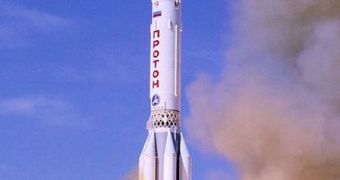On August 18, a Proton-M rocket placed a $300 million telecommunications satellite in an unusable orbit. The event forced the Russian Federal Space Agency to stop all flights, pending the results of an internal review. Its conclusions show that a programming error was responsible for the glitch.
What this implies is that the heavy-lift delivery system will enter active duty again. They are scheduled to launch three times over the next month and a half, so that RosCosmos and associated partners can keep up with their planned launch manifests.
Both Proton-M rockets and the Breeze-M upper stages they carry are usually very reliable, and instances when either of them fail are very rare. However, when that happens, researchers need to establish the exact causes of the malfunction.
In addition to RosCosmos, Reston, Virginia-based International Launch Services (ILS) is expected to conduct an independent review of its own. According to analysts, it is very likely that those conclusions will agree with the ones published by the Russian space agency
Moscow-based Russian Satellite Communications Co. (RSCC) – the owner of the satellite – has recently declared the mission a total failure. The spacecraft is in a very different orbit than intended, and maneuvers to bring it into a more appropriate position are extremely difficult.
Unrelated to the poor launch trajectory, the satellite itself appears to be experiencing communications problems, which makes it very difficult for experts to mount a retrieval and rescue operation.
As soon as the first reports indicated the error in launch, all Breeze-M flights were suspended, and Proton missions carrying these upper stages along with them. The ban was put into effect in order to ensure the error that doomed this mission did not affect others.
Now that a programming error has been identified as the source of the failure, RosCosmos announces that the ban has been lifted, and that next payload to use the Proton/Breeze-M combo is a military telecommunications satellite developed by the Russian Defense Ministry.
According to ILS and Luxembourg-based satellite fleet operator SES, the QuetzSat-1 telecommunications satellite will be the next payload to use this launch combo. Its launch date is now set for some time in late September, Space reports.
The third Proton-M launch will take three new Glonass satellites to Earth's orbit. These spacecraft are part of Russia's growing satellite navigation network, which it is developing in response to the American Global Positioning System, the European Galileo, and the Chinese Baidu.

 14 DAY TRIAL //
14 DAY TRIAL //